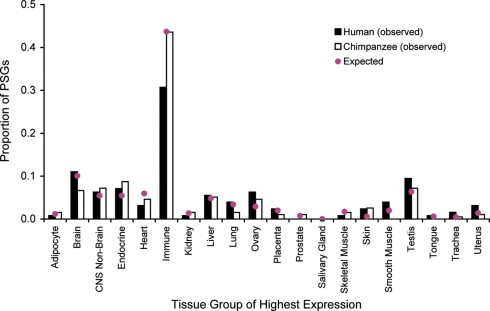
Where the positively selected genes are expressed in both chimps and humans
I have posted the following comment:
What is really interesting is that there is no major peak relating to the brain – which suggests that there have been no significant changes to how the brain works – although I suspect that the peak for “immature” is because there have been major changes on this front to allow humans infants to have more time to “load” their brain with learning.
I am working on a model of the brain’s neural code protocol which suggests that it is highly resistant to evolutionary change – and the work so far suggests that the difference between humans and apes is basically one of rate of learning. When cultural know-how of a group reaches a critical level it becomes advantageous to concentrate on copying ones parents and other adults. However trail and error copying is slow, and things would speed up with just a simple language where the adult can explain how to use tools, and not just imitate. And language is just a tool – so if you can talk about better tools language can also bootstrap itself to higher levels over the generations.
To speed up the process even more, it the infant brain uncritically accepts language as the main tool, and language starts to use abstract terms, learning is greatly accelerated. (i.e. if you can tell a child what characterizes a mammal he does not have to learn about lots of different mammals.).
My works suggesting possibly three explosive changes leading to our current levels of intelligence – none of which mean any significant change in the neural code mechanism. (1) simple language allows better tools (2) language expands to allow abstract terms – allowing more information to be packed into less learning time (3) people specialize so that it is not longer necessary for everyone to learn the complete cultural package. The first two would lead to pressure to evolve a bigger brain to hold more cultural information. The third actually frees some of the brain’s capacity to diversify into imaginative tasks such as music and the arts which may have no obvious evolutionary advantages (apart from selection of a sexual partner).
There is a side issue relating to some of the clever Chimps in captivity – as if the big difference between humans and chimps (apart form brain size) relates to the way the adults train the children, it would seem possible that chimps which have been taught by humans will lean more effectively that chimps brought up by their chimp parents.
So do you agree that the results you give suggest that the main differences between human and human brains are the capacity and they why information is conveyed between generations.Adam replied:
I have written about some research that indicates in many ways the human brain is a scaled up chimp brain, so I can see how not a lot of genetic change would be needed to produce our noggin. So in essence I agree with you, although I hadn’t really considered the way information is conveyed. Now you bring it up though it does seem kinda obvious

No comments:
Post a Comment